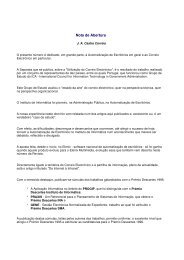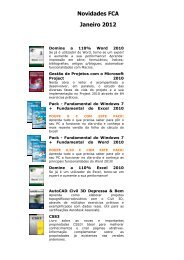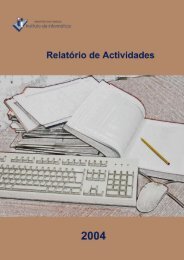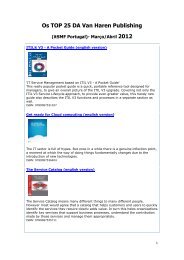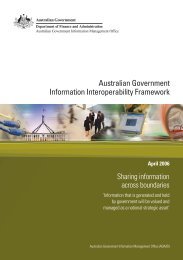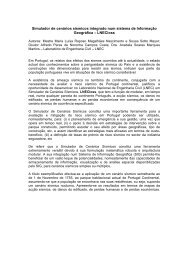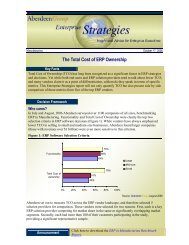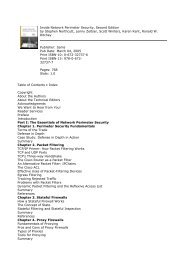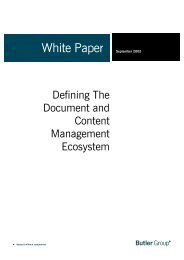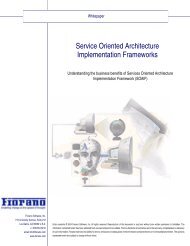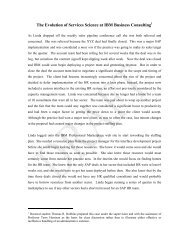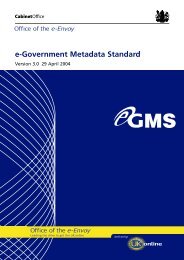OECD Peer Review of E-Government in Denmark - ePractice.eu
OECD Peer Review of E-Government in Denmark - ePractice.eu
OECD Peer Review of E-Government in Denmark - ePractice.eu
You also want an ePaper? Increase the reach of your titles
YUMPU automatically turns print PDFs into web optimized ePapers that Google loves.
The additional workload is connected to problems many bus<strong>in</strong>esses (particularly smaller ones)<br />
are experienc<strong>in</strong>g <strong>in</strong> comply<strong>in</strong>g with new <strong>in</strong>voic<strong>in</strong>g requirements. These <strong>in</strong>clude wrong or miss<strong>in</strong>g<br />
<strong>in</strong>formation, creation <strong>of</strong> duplicate <strong>in</strong>voices, and disappearance <strong>of</strong> some <strong>in</strong>voices with<strong>in</strong> the system.<br />
<strong>Government</strong> organisations have been obliged to use manual processes (i.e. telephone calls) to<br />
complete or correct these <strong>in</strong>voices before they can be processed. They have also had to handle an<br />
unanticipated level <strong>of</strong> enquiries from suppliers want<strong>in</strong>g to know that their <strong>in</strong>voices have been received.<br />
These costs are prov<strong>in</strong>g significant. Evidence <strong>of</strong> these problems is provided by municipalities, which<br />
have had their State fund<strong>in</strong>g reduced on the basis <strong>of</strong> the expected sav<strong>in</strong>gs from e-Faktura. Because<br />
these sav<strong>in</strong>gs have yet to materialize, they have asked the M<strong>in</strong>istry <strong>of</strong> F<strong>in</strong>ance for compensation for<br />
the extra costs they have been <strong>in</strong>curr<strong>in</strong>g while deal<strong>in</strong>g with these problems.<br />
Danish bus<strong>in</strong>esses have been strongly critical <strong>of</strong> the way e-Faktura has been implemented, to the<br />
po<strong>in</strong>t that the M<strong>in</strong>ister <strong>of</strong> F<strong>in</strong>ance issued a request that government organisations be flexible <strong>in</strong> their<br />
implementation <strong>of</strong> the new <strong>in</strong>voic<strong>in</strong>g rules dur<strong>in</strong>g the first months <strong>of</strong> their enforcement – especially by<br />
pay<strong>in</strong>g <strong>in</strong>voices on time and refra<strong>in</strong><strong>in</strong>g from impos<strong>in</strong>g penalties for <strong>in</strong>complete and/or paper <strong>in</strong>voices.<br />
None <strong>of</strong> these problems appear to be <strong>in</strong>surmountable, and there is every <strong>in</strong>dication that the new<br />
system will eventually meet its objectives. However, it is important that <strong>Denmark</strong> treat this experience<br />
as a valuable lesson <strong>in</strong>: 1) the need to fully identify and plan for the risks that exist around rapid<br />
digitalisation <strong>of</strong> government processes on such a wide scale; 2) the sensitivity <strong>of</strong> the costs and benefits<br />
<strong>of</strong> e-government bus<strong>in</strong>ess cases to unanticipated events; and 3) the importance <strong>of</strong> committ<strong>in</strong>g<br />
sufficient resources to processes <strong>of</strong> stakeholder engagement and change management.<br />
Box 6.3 E-government implementation risks and challenges<br />
<strong>Denmark</strong>’s e-Faktura electronic <strong>in</strong>voic<strong>in</strong>g system is a good example <strong>of</strong> how government can apply ICT to redesign<br />
common (or generic) back-<strong>of</strong>fice bus<strong>in</strong>ess processes <strong>in</strong> pursuit <strong>of</strong> significant benefits, both for government and/or<br />
bus<strong>in</strong>esses and citizens. It is also a very good example <strong>of</strong> some <strong>of</strong> the risks and challenges that can accompany<br />
e-government-enabled change <strong>of</strong> such magnitude.<br />
The bus<strong>in</strong>ess case for e-Faktura identified significant sav<strong>in</strong>gs from mov<strong>in</strong>g to a purely electronic approach to<br />
<strong>in</strong>voic<strong>in</strong>g <strong>of</strong> government organisations. The estimated efficiency and economic benefits <strong>of</strong> mak<strong>in</strong>g this change<br />
were judged to be <strong>of</strong> sufficient size that a legislatively mandated move to electronic <strong>in</strong>voic<strong>in</strong>g, coupled with<br />
closure <strong>of</strong> non-electronic channels for <strong>in</strong>voic<strong>in</strong>g, was justified.<br />
As part <strong>of</strong> the rapid implementation <strong>of</strong> this change, consideration was given to the impact it would have on both<br />
bus<strong>in</strong>esses and government organisations, with special attention paid to ensur<strong>in</strong>g that small Danish bus<strong>in</strong>esses<br />
without the necessary ICT capability were provided with alternative means to present electronic <strong>in</strong>voices. Despite<br />
this, dur<strong>in</strong>g implementation a range <strong>of</strong> unanticipated problems has threatened achievement <strong>of</strong> expected sav<strong>in</strong>gs<br />
from e-Faktura, at least <strong>in</strong> the short-term. Technical implementation has been more difficult than expected, and<br />
bus<strong>in</strong>esses have responded by charg<strong>in</strong>g additional <strong>in</strong>voic<strong>in</strong>g fees and present<strong>in</strong>g <strong>in</strong>complete or duplicate<br />
<strong>in</strong>voices. <strong>Government</strong> organisations have also reacted <strong>in</strong> unexpected ways. For example, municipalities have<br />
requested f<strong>in</strong>ancial compensation for implementation costs. In addition to risks to the bus<strong>in</strong>ess case for e-Faktura,<br />
these problems also created political risk, with the <strong>Government</strong> be<strong>in</strong>g extensively lobbied by bus<strong>in</strong>esses critical <strong>of</strong><br />
the implementation process and the problems it has created for them.<br />
In the short term, the <strong>Government</strong> has responded by requir<strong>in</strong>g government organisations to take a more flexible<br />
and lenient approach to the failure <strong>of</strong> bus<strong>in</strong>esses to fully comply with the <strong>in</strong>voic<strong>in</strong>g rules. In the longer run, it<br />
appears that the problems currently be<strong>in</strong>g encountered will be rectified, and that the new system will eventually<br />
deliver the full benefits expected <strong>of</strong> it. In the meantime, the experience <strong>of</strong> implement<strong>in</strong>g e-Faktura provides a good<br />
opportunity for <strong>Denmark</strong> to learn important lessons about mak<strong>in</strong>g successful e-government-enabled change <strong>of</strong><br />
such large scope. It is especially important to ensure that e-government bus<strong>in</strong>ess cases factor <strong>in</strong> risk, and to plan<br />
for adequate levels <strong>of</strong> resourc<strong>in</strong>g for stakeholder engagement and change management.<br />
102



